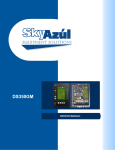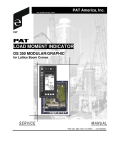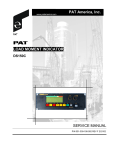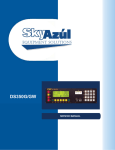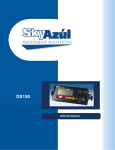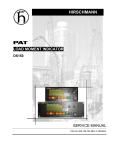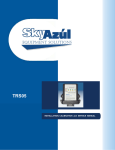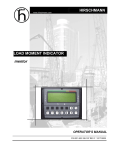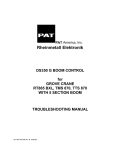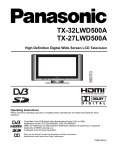Download HIRSCHMANN TROUBLESHOOTING MANUAL LOAD MOMENT
Transcript
HIRSCHMANN www.hirschmann.com LOAD MOMENT INDICATOR DS 350GM TROUBLESHOOTING MANUAL P/N 031-300-190-113 REV A – 05/01/2001 Service Manual DS 350 GM NOTICE The information in this document is subject to change without notice. Hirschmann makes no warranty of any kind with regard to this material, including, but not limited to the implied warranties of merchantability and fitness for a particular purpose. Hirschmann shall not be liable for errors contained in this manual or for incidental or consequential damages in connection with the furnishing, performance, or use of this manual. This document contains proprietary information, which is protected by copyright. All rights are reserved. No part of this document may be photocopied, reproduced, or translated into another language without the prior written consent of Hirschmann. Hirschmann reserves proprietary rights to all drawings and to the data shown thereon. The drawings and data are confidential and are not to be used or reproduced without prior written consent of Hirschmann. The drawings are subject to technical modification without prior notice. © 1999 PAT GmbH, D-76275 Ettlingen / Germany © PAT Rev A 05/01/01 // SB © 2006 Hirschmann, Chambersburg, PA 17201, USA 190113_A Service Manual DS 350 GM TABLE OF CONTENTS 1 GENERAL INFORMATION ............................................................................................... 1 2 WARNINGS .......................................................................................................................2 3 FLOWCHARTS ................................................................................................................. 3 3.1 GENERAL FLOWCHART ........................................................................................... 3 3.2 ERROR CODE DISPLAY............................................................................................ 4 3.3 LEVER LOCKOUT ACTIVATED ............................................................................... 13 3.4 BROKEN LENGTH CABLE ....................................................................................... 14 3.5 NO DISPLAY............................................................................................................. 15 3.6 ANTI-TWO BLOCK PROBLEM ................................................................................. 17 3.7 LENGTH READING PROBLEM ................................................................................ 20 3.8 ANGLE READING PROBLEM .................................................................................. 23 3.9 LOAD READING PROBLEM..................................................................................... 25 3.10 BAD DATA TRANSFER BETWEEN CONSOLE & CENTRAL UNIT OR INTERFERENCE PROBLEM .................................................................................... 26 4 DRAWINGS ..................................................................................................................... 29 4.1 DRAWING 1. ELECTRICAL WIRING FOR CENTRAL UNIT TO PRESSURE TRANSDUCERS AND CRANE ................................................................................. 29 4.2 DRAWING 2. ELECTRICAL WIRING FOR CENTRAL UNIT TO CONSOLE............ 30 4.3 DRAWING 3. ELECTRICAL WIRING FOR CENTRAL UNIT TO CABLE REEL/ANTI-TWO BLOCK ......................................................................................... 31 4.4 DRAWING 4. CENTRAL UNIT - PARTS LIST .......................................................... 32 4.5 DRAWING 6. CABLE REEL - PARTS LIST .............................................................. 36 4.6 DRAWING 7. CENTRAL UNIT MAIN BOARD LAYOUT ........................................... 38 4.7 DRAWING 8. CONSOLE CONNECTION BOARD.................................................... 39 4.8 DRAWING 9. CENTRAL UNIT ANALOG INPUT MODULE ...................................... 40 5 PROCEDURES................................................................................................................ 41 5.1 PROCEDURE 1. STRAIN RELIEF INSTALLATION ................................................. 41 5.2 PROCEDURE 2. EPROM LOCATION AND INSTALLATION ................................... 42 5.3 PROCEDURE 3. MAIN BOARD REPLACEMENT .................................................... 43 5.4 PROCEDURE 4. PRESSURE TRANSDUCER ZERO ADJUSTMENT ..................... 44 5.4.1 USING GRAPHIC CONSOLE FOR ZERO-SETTING OF PRESSURE TRANSDUCER & FORCE INPUTS .................................................................44 5.5 PROCEDURE 5. LENGTH AND ANGLE SENSOR ADJUSTMENT ......................... 45 6 THEORY .......................................................................................................................... 46 6.1 THEORY 1. OPERATION OF BOOM LENGTH SENSOR........................................ 46 Measuring current:............................................................................................................... 46 Measuring voltage: .............................................................................................................. 46 6.2 THEORY 2. OPERATION OF PISTON SIDE LOAD SENSOR ................................. 47 6.3 THEORY 3. OPERATION OF ROD SIDE LOAD SENSOR ...................................... 48 6.4 THEORY 4. OPERATION OF ANGLE SENSOR ...................................................... 49 Rev A 05/01/01 // SB 190113_A General Information 1 1 GENERAL INFORMATION This troubleshooting manual is designed to assist a service or maintenance person in identifying system problem areas or malfunctions. A digital voltmeter with the capability to also measure current will be required. Regular maintenance and service tools will also be required. NOTE: Knowledge of how to use a voltmeter to measure both voltage and current is assumed. REFERENCE: For system operation, refer to the operator’s manual for the console. This may differ from crane manufacturer and model. Section 3.1 is a general flow chart that directs you to detailed flow charts and sections. Section 3.2 provides a list of error codes, error, cause, and possible action for the error. Sections 3.3 – 3.11 provide detailed flow charts to define and correct the root cause. Section 4 provides drawings that will be referenced for troubleshooting. Section 5 provides procedures that will be referenced for troubleshooting. Section 6 provides drawings for the theory of operation of all the different sensing devices used in the DS350G Modular System. Use these reference drawings to better understand the operation of the system. Rev A 05/01/01 // SB 190113_A 2 2 Service Manual DS 350 GM WARNINGS The LMI is an operational aid that warns a crane operator of approaching overload conditions and overhoist conditions that could cause damage to equipment and personnel. Therefore, the device is not, and shall not be, a substitute for good operator judgment, experience and use of accepted safe crane operating procedures. The responsibility for the safe crane operation shall remain with the crane operator who shall ensure that all warnings and instructions supplied are fully understood and observed. Prior to operating the crane, the operator must carefully and thoroughly read and understand the information in the crane’s operating manuals to ensure that the operator knows the operation and limitations of indicator and crane. PAT Load Moment Indicator (LMI) DS 350 Modular The PAT Load Moment Indicator (LMI) DS 350 Modular has been designed to provide the crane operator with the essential information required to operate the machine within the designed parameters. Using different sensing devices, the DS 350 Modular LMI monitors various crane functions and provides the operator with a continuous display of the crane’s capacity. The display continually changes as the crane moves through the motions needed to make a lift. If non-permitted conditions are approached, the DS 350 LMI will warn the operator by sounding an audible alarm and lighting a warning light. In addition the LMI system has the capability to provide a signal to the solenoids and thereby locking out those functions that may aggravate the crane’s condition. Rev A 05/01/01 // SB 190113_A Flowcharts 3 3 FLOWCHARTS 3.1 GENERAL FLOWCHART This section explains how to handle a problem that may arise with the PAT DS 350 Modular LMI. The procedures are given in flowchart format for the following sections. Start with the general flowchart below that will guide you to one of the detailed flowcharts shown in this section. The drawings and procedures that are referenced in these sections can be found in Sections 4 and 5. What’s Wrong? Error Code Displayed Go to Section 3.1 Lever Lockout Activated Go to Section 3.3 Broken Length Cable Go to Section 3.4 No display Go to Section 3.5 Anti-Two Block Problem Go to Section 3.6 Length Reading Problem Go to Section 3.7 Angle Reading Problem Go to Section 3.8 Load Reading Problem Go to Section 3.9 Bad Data Transfer/Interference Between Central Unit and Console Go to Section 3.10 Rev A 05/01/01 // SB 190113_A 4 3.2 Service Manual DS 350 GM ERROR CODE DISPLAY PROBLEM: Error code displayed. Lever lockout activated. Warning lights on. ERRO R CODE E01 ERROR CAUSE ACTION Minimum radius or maximum angle range exceeded Fallen below the minimum radius or above the angle given in the load chart due to raising the boom to far. The maximum radius or minimum angle given in the load chart was exceeded due to lowering the boom too far. Slewing range prohibited with load. Operating mode switch in the console set incorrectly. Operating mode is not permissible with actual crane configuration. Boom has been extended too far or not far enough. Length sensor adjustment changed; i.e. length sensor cable slid off the cable drum. Fallen below the minimum jib angle specified n the respective load chart due to luffing out the jib too far. Overload relay is stuck, defective or not being selected. Anti-Two-Block switch relay is defective or not being selected. Lower boom back to a radius or angle given in the load chart. E02 Maximum radius or minimum angle range exceeded E03 Prohibited slewing range (no load area) Operating mode not available E04 E05 Length range not permitted E06 Fallen below angle range with luffing jib operation. E07 No acknowledgment signal from overload relay (K1). No acknowledgment signal from Anti-TwoBlock switch relay (K2). Error in length measurement E08 E10 Rev A 05/01/01 // SB With the boom fully retracted, the length differs by more than 2%. Raise boom back to a radius or angle given in the load chart. Slew back into admissible range. Set operating mode switch correctly to the code assigned to the operating mode of the crane. Refer to Section 3.7. Retract or extend boom to correct length given in the load chart. Luff in the jib to a radius or angle specified in the load chart. Replace main board in central unit. Refer to Drawing 4 and Procedure 3 in Section 5.3 Replace main board in central unit. Refer to Drawing 4, Section 4.4, and Procedure 3 in Section 5.3. Refer to Section 3.7. 190113_A Flowcharts 5 ERRO R CODE E11 ERROR CAUSE ACTION Fallen below limit for the measuring channel “length”. a.) Cable between length sensor and central unit defective, not connected or water in the connectors. b.)Length sensor Potentiometer defective. c.)Electronic board in the measuring channel defective. Refer to Section 3.7 a.)Check cable and connector b.) Check and reset length sensor Potentiometer. Refer to Procedure 5. c.) Check signal on main board and analog input module. E12 Fallen below lower limit value for the measuring channel “pressure transducer piston side”. Refer to Section 3.9 a.)Check cable and connector b.)Check pressure transducer and reset pressure channel. c.) Check signal on main board and analog input module. E13 Fallen below lower limit value for the measuring channel “pressure transducer rod side”. E14 Fallen below lower limit value for the measuring channel “force”. E 15 Fallen below lower limit value for the measuring channel “angle main boom”. a.) Cable leading from the central unit to the pressure transducer defective, loose or water in the connector. b.)Pressure transducer on piston side defective. c.)Electronic component in the measuring channel defective. a.)Cable leading from the central unit to the pressure transducer defective, loose or water in the connector. b.)Pressure transducer on rod side defective. c.)Electronic component in the measuring channel defective. a.)Cable leading from the central unit to the pressure transducer defective, loose or water in the connector. b.)Force transducer defective. c.)Electronic component in the measuring channel defective. a.)Cable from central unit to the length/angle sensor defective or loose. b.)Angle sensor defective. c.)Electronic component in the measuring channel defective. Rev A 05/01/01 // SB Refer to Section 3.9 a.)Check cable and connector b.) Check pressure transducer and reset pressure channel. c.) Check signal on main board and analog input module. a.) Check cable and connectors as well and replace, if necessary. b.)Check force transducer. c.) Check signal on main board and analog input module. Refer to Section 3.8 a.) Check cable. b.) Check angle sensor and reset adjustment. Refer to Procedure 5 c.) Check signal on main board and analog input module. 190113_A 6 Service Manual DS 350 GM ERRO R CODE E16 ERROR CAUSE ACTION Fallen below lower limit value for measuring channel “Luffing Jib Angle”. a.) Check cable. b.) Check angle sensor and reset adjustment. c.) Check signal on main board and analog input module. E17 Fallen below lower limit value for the measuring channel 7. E18 E19 Outrigger overloaded Error in the reference voltage. Below limiting value for slewing angle 1. a.)Cable from central unit to angle sensor defective or disconnected or water inside the plug. b.)Angle sensor defective. c.)Electronic component in the measuring channel defective. a.)Cable leading from the central unit to the sensor of channel 7 defective, loose or water in the connectors. b.)Sensor of channel 7 defective. c.)Electronic component in the measuring channel 7 defective. Front outrigger overloaded Electronic component on the main board defective. a.)Cable from central unit to the slewing angle sensor defective or loose. b.)Slewing angle potentiometer defective. c.)Electronic component in the measuring channel defective on main board. a.)Cable from central unit to the length/angle sensor defective or loose. b.)Length potentiometer defective. c.)Electronic component in the measuring channel defective on main board. E1A E1B Below limiting value for slewing angle 2. E21 Upper limiting value for the measuring channel “length” exceeded. Rev A 05/01/01 // SB a.) Check cable and connectors. b.) Check sensor of channel 7 and reset adjustment. c.) Check signal on main board and analog input module. Check outrigger sensor Replace main board. Refer to Drawing 4 and Procedure 3. a.) Check cable. b.) Check and reset slewing angle potentiometer. c.) Check signal on main board and analog input module. Refer to Section 3.7 a.) Check cable and connector b.) Check and reset length sensor Potentiometer. Refer to Procedure 5. c.) Check signal on main board and analog input module. 190113_A Flowcharts 7 ERRO R CODE E22 ERROR CAUSE ACTION Upper limiting value for the measuring channel “pressure piston side” exceeded. Refer to Section 3.9 a.) Check cable and connector b.) Check pressure transducer and reset pressure channel. c.) Check signal on main board and analog input module. E23 Upper limit value for the measuring channel “pressure transducer rod side” exceeded. E24 Upper limit value for the measuring channel “force” exceeded. E25 Upper limit value for the measuring channel “angle main boom” exceeded. E26 Upper limit value for the measuring channel “Luffing Jib Angle” exceeded. a.)Cable from central unit to the pressure transducer defective, loose or water in the plug. b.)Pressure transducer on piston side defective. c.)Electronic component in the measuring channel defective on main board. a.) Cable lead in from the central unit to press trans defective, not connected or water in the connectors. b.) Pressure transducer on rod side defective. c.) Electronic component in the measuring channel defective. a.) Cable leading from the central unit to the force transducer defective, not connected or water in the connectors. b.) Force transducer defective. c.) Electric component in the measuring channel defective. a.) Cable leading from the central unit to the length/angle sensor defective, loose or water in the connectors. b.) Angle sensor defective c.) Electronic component in the measuring channel defective. a.) Cable leading from the central unit to the jib angle sensor defective, loose or water in the connectors. b.) Jib angle sensor defective. c.) Electronic component in the measuring channel defective. Rev A 05/01/01 // SB Refer to Section 3.9 a.) Check cable and connector b.) Check pressure transducer and reset pressure channel. c.) Check signal on main board and analog input module. a.) Check cable and connectors as well and replace, if necessary. b.) Check force transducer. c.) Check signal on main board and analog input module. Refer to Section 3.8 a.) Check cable. b.) Check angle sensor and reset adjustment. Refer to Procedure 5 c.) Check signal on main board and analog input module. a.) Check cable. b.) Check angle sensor and reset adjustment. c.) Check signal on main board and analog input module. 190113_A 8 Service Manual DS 350 GM ERRO R CODE E27 ERROR CAUSE ACTION Upper limit value for the measuring channel 7 exceeded. a.) Check cable and connectors. b.) Check sensor of channel 7 and reset adjustment. c.) Check signal on main board and analog input module. E29 Reference voltage defective. a.) Cable leading from the central unit to the sensor of channel 7 defective, loose or water in the connectors. b.) Sensor of channel 7 defective. c.) Electronic component in the measuring channel 7 defective. a.) The total of the supply and the reference voltages on MP10 is more than 3.3V b.) A/D converter defective. E2A Above limiting value for slewing angle 1. E2B Above limiting value for slewing angle 2. E31 Error in the system program. E37 Error in the program run E38 System program and Data EPROM do not match. E39 System program and TLK EPROM do not match. E41 Error in the external RAM. Rev A 05/01/01 // SB a.)Cable from central unit to the slewing angle sensor defective or loose. b.)Slewing angle potentiometer defective. c.)Electronic component in the measuring channel defective on main board. a.) EPROM with system program defective. b.) Electronic component on the main board defective. a.) EPROM with system program defective. b.) Electronic component on the main board defective. The system program in the LMI does not correspond to the programming in the data EPROM The system program in the LMI does not correspond to the programming in the data EPROM Defective electronic component. a.) Check supply voltages. b.) Replace main board or analog input module. Refer to Drawing 4 and Procedure 3 Steps 1,2,4, 11,12.. a.) Check cable. b.) Check and reset slewing angle potentiometer. c.) Check signal on main board and analog input module. a.) Replace system program EPROM b.) Check signal on main board and analog input module. a.) Replace system program EPROM. b.) Check signal on main board and analog input module. Replace system program EPROM or Data EPROM. Refer to Procedure 2 Replace system program EPROM or TLK EPROM. Refer to Procedure 2 Replace main board or analog input module. Refer to Drawing 4 and Procedure 3, Steps 1,2,4, 11, and 12. 190113_A Flowcharts 9 ERRO R CODE E42 ERROR CAUSE ACTION Error in the external write/read memory (RAM). Part 1 Internal defect in digital part of CPU. E43 Error in the external write/read memory (RAM). Part 2. Internal defect in digital part of CPU. E45 Redundancy error in A/D conversion. Defective electronic component. E46 Error in A/D conversion. Defective electronic component. E47 Malfunction in the monitored write/read memory. Cyclic RAM test: Error in the internal write/read memory. Error in data EPROM. Internal defect in digital part of CPU Exchange write/read memory (CMOS-RAM). Replace CPU module. Refer to Drawing 4 and Procedure 3, Steps 1-3, 13,14. Exchange write/read memory (CMOS-RAM). Replace CPU module. Refer to Drawing 4 and Procedure 3, Steps 1-3, 13,14. Replace analog input module. Refer to Drawing 4 and Procedure 3, Steps 1,2,4, 11,12. Replace analog input module. Refer to Drawing 4 and Procedure 3 Steps 1,2,4, 11,12. Replace CPU module. Refer to Drawing 4 and Procedure 3 Steps 1-3, 13,14 Replace CPU module. Refer to Drawing 4 and Procedure 3 Steps 1-3, 13,14 Replace Data EPROM. Make sure BR3 on the main board is installed. Refer to Procedure 2. E48 E51 E52 E56 Error in load chart EPROM. Error in crane data EEPROM. Internal defect in digital part of CPU EPROM Module not bridged correctly Data EPROM on the main board defective. EPROM Module not bridged correctly Data EPROM on the main board defective. Memory module wrongly bridged. Crane data EEPROM defective Rev A 05/01/01 // SB Replace EPROM Module and reset pressure channels. Refer to Drawing 4 and Procedure 4. Bridge memory module acc. To memory type Replace crane data EEPROM Replace EPROM Module and reset pressure channels. Refer to Drawing 4 and Procedure 4. 190113_A 10 Service Manual ERROR ERROR CAUSE CODE E57 Error in serial crane data Serial crane data EEPROM EEPROM. does not contain valid data. Memory module defective E58 E69 E70 E71 E72 – E77 E84 E85 E89 Error in the serial analog No valid data in the serial data EEPROM. analog data EEPROM. Error in the load chart EPROM The number of the selected EPROM base and the programmed value are not identical Error in digital output module. Rev A 05/01/01 // SB ACTION Write data on the serial crane data EEPROM (by means of test program or on-line function), then restart the LMI Replace EPROM Module and reset pressure channels. Refer to Drawing 4 and Procedure 4. Write data on the serial analog data EEPROM by means of the test program, then, restart the LMI Replace LMI main board. LMI main board defective. Memory module wrongly Bridge memory module acc. to bridged memory type Load chart EPROM defective Replace load chart EPROM Central unit unable to correspond with digital output module. Incorrect a.) Anti Two-block relay is acknowledgment of the stuck or defective. 1. Relay on the main b.) Anti Two-Block relay is board. not being selected due to a break on the main board. Analogous to E71 for Analogous to E71 for the the relays 2...7. relays 2...7. Wrong rigging condition. The selected rigging condition is not contained in the data EPROM. Error in the radius The computed radius is too determination small (negative deflection) Change of the operating code during lifting a load. DS 350 GM The operating mode switch in the console was used during lifting a load. a.) Check supply voltage. b.) Replace digital output module. Replace main board. Refer to Drawing 4 and Procedure 3. Analogous to E71 for the relays 2..7. Select another rigging condition Check the programming in the data EPROM. Check the programming in the data EPROM. Lower the load and set the operating mode switch correctly to the code assigned to the actual operating mode of the crane. 190113_A Flowcharts ERROR ERROR CODE E 91 No data transmission from console to central unit. (Refer to Section 9) E92 E93 E94 11 CAUSE ACTION a.)24V supply of console interrupted. b.)Interruption or accidental ground in the line from console electronics to central unit. c.)Transmitter/receiver module defective. a.) Check 24V at terminal X1 of console electronics. b.) Check the connection between console electronics and central unit. c.) If accidental ground occurs, the transmitter module in the console electronics can be damaged. Replace the console electronics or main board respectively. a.) Check the connection between console electronics and central unit. Error in the data transmission from console to central unit. (Refer to also Section 3.10) Error in the data transmission from central unit to console. (Refer to also Section 3.10) a.) Temporary interruption of the data line from console electronics to central unit. b.) Transmitter/receiver module defective. a.) Temporary interruption of the data line from console electronics to central unit. b.) Transmitter/receiver module defective. No data transmission for central unit to console. (Refer to also Section 3.10) a.) Interruption or accidental ground in the line from console electronics to central unit. b.) Transmitter/receiver module defective. c.) Data-EPROM defective. d.) CPU defective. e.) Electromagnetic interference (when switching contractors or valves) Rev A 05/01/01 // SB Refer to Section 3.10. a.) Check the connection between console electronics and central unit. b.) Replace console electronics or main board respectively. Refer to Section 3.10. a.) Check the connection between console electronics and central unit. If you find an accidental ground, the transmitter module in the console electronics can be damaged. Replace the console electronics. b.) Replace console electronics or main board respectively. c.)Check data EPROM. d.) Replace CPU module. Refer to Drawing 4 and Procedure 3 Steps 1-3, 13,14. e.) Eliminate interference source by inverse diodes or varistors. 190113_A 12 ERRO R CODE E95 E96 E97 E98 EAB Service Manual DS 350 GM ERROR CAUSE ACTION Error in the crane data EPROM a.) Data EPROM defective b.) Position of jumper for the selection of the type of EPROM is wrong c.) Electronics component on the main board defective. CPU or main board of the console defective a.) Replace data EPROM b.) Check the jumper position Error in the internal RAM of the CPU of the console Error in the external RAM of the CPU of the console Wrong jumper position in the console Short circuit in the A2B switch circuit a.) External RAM of the console defective b.) Electronic component on the main board defective. a.) The jumper position BR 9/BR 10 in the console does not correspond to the actual type of central unit. b.) Electronic component on the main board defective. Short circuit in the A2B switch Short circuit in the cable to the A2B switch c.) Replace CPU module. Refer to Drawing 4 and Procedure 3 Steps 1-3, 13,14 Replace CPU module. Refer to Drawing 4 and Procedure 3 Steps 1-3, 13,14 a.) Replace console main board b.) Replace console main board Refer to Drawing 5. a.) Check the jumper position b.) Replace console main board Refer to Drawing 5. Refer to Section 3.6. Replace A2B switch Replace cable to the A2B switch Electronic component on the analog input module defective. Check analog input module. Replace if necessary., Refer to Drawing 4 and Procedure 3 Steps 1,2,4, 11,12. Note: If an error message is displayed which is not contained in above list, please contact the PAT service department. Rev A 05/01/01 // SB 190113_A Flowcharts 3.3 13 LEVER LOCKOUT ACTIVATED PROBLEM: The lever lockout system of the crane is activated. Crane movements “hoist up”, “telescope out”, and “boom down” are stopped. Crane is not in overload or two-block condition. Start Use the key switch and the LMI by-pass button on the console to override the LMI. Refer to the Operator’s Handbook for LMI override instructions (pages12 and 13). Corrected YES NO Does console indicate Anti-Two-block warning? NO YES Fault in crane electric or hydraulic system. If console display are blank. The fault is located in power supply, wiring or fuses . Fault in Anti-Two Block system. Check lever lockout system in crane service manual. Go to Section 3.5 Go to Section 3.6 Rev A 05/01/01 // SB If the display Load Moment Limit Light is lit. The fault is located in LMI, cables, wiring, fuses, or console. Read error code displayed on console & go to Section 3.2. 190113_A 14 3.4 Service Manual DS 350 GM BROKEN LENGTH CABLE PROBLEM: Damaged or broken length cable. Replace length cable using the following procedure: Refer to Section 4 for the following drawings: Drawing 3 - Electrical Wiring Central Unit to Cable Reel Drawing 6 - Cable Reel - Parts List 1. 2. 3. 4. 5. 6. 7. 8. 9. 10. 11. 12. 13. 14. Cut old cable at cable drum. Disconnect damaged length cable from junction box at the boom nose. Refer to Drawing 3. Open cable reel cover and disconnect wiring from terminal block. Pull 7 conductor cable out of strain relief. Note: Mark wires to make re-connection simpler. Remove cable reel from mounting brackets. Remove damaged length cable, which is mounted to the slip rings in the cable reel, from slip ring terminal. Refer to Drawing 3. On the back side of the cable reel, open the strain relief attached to the axle in the center of the drum. Pull existing length cable out of the cable reel. Pull new length cable through the hole, pipe and strain relief and push it through the axle of the reeling drum. Tighten new strain relief to ensure sealing. Reconnect the length cable to the slip ring. Refer to Drawing 3. Remount cable reel to the boom. Turn reeling drum clockwise to spool the new cable neatly onto the drum. Set pre-load on cable reel by turning the drum counter-clockwise 5 to 8 turns. Run the new length cable through the cable guides and wrap the length cable around the boom tip anchor pin (4 or 5 wraps) and secure with tie wraps. Leave enough length cable to connect into the boom tip junction box. Connect the length cable into the boom tip junction box. Refer to Drawing 3. Reset length potentiometer in length angle transducer (screw is located in center of white gear); with boom fully retracted, turn potentiometer carefully counter-clockwise until it stops. Recheck length and angle display. Refer to Procedure 5 in Section 5.5. Rev A 05/01/01 // SB 190113_A Flowcharts 3.5 15 NO DISPLAY PROBLEM: Blank console display with no warning light shown. All crane moments have been stopped. START Check fuses in central unit. Correct? NO Replace fuses. YES Measure voltage on the main board terminal strip between X1:1 (+12/24V) and X1:2 (ground). This is an input voltage from the crane. Refer to Drawing 1 in Section 4. Correct? NO Check crane power supply for faulty crane electric. YES Measure voltage on the main board between X1:3 (+12/24V) and X1:4 (ground). This is an output voltage to the console. Refer to Drawing 1 in Section 4. Correct? NO Replace the main board in central unit. Refer to Drawing 4 in Section 4 and Replacement Procedure 3 in Section 5. YES NEXT PAGE Rev A 05/01/01 // SB 190113_A 16 Service Manual DS 350 GM PREVIOUS PAGE Measure voltage in the console between X1:1 (+12/24V) and X1:2 (ground). Refer to Drawing 2 & 8 in Section 4. Correct? Check connections of the cable between console and central unit. Replace cable if necessary. Refer to Drawing 2 in Section 4. NO YES Console/Display is defective. Replace the console. Refer to Drawing 3 in Section 4. YES END Rev A 05/01/01 // SB 190113_A Flowcharts 3.6 17 ANTI-TWO BLOCK PROBLEM PROBLEM: Function of Anti-Two-Block System is faulty. START Check to see whether or not crane is in two-block condition. Correct? NO Lower hook down into safe position YES Check Bypass plug installed Refer to Drawing 3 in Section 4. Correct? Plug appropriate bypass plug into socket of junction box. No YES Turn power off or disconnect wire from connection board X1:31 in central unit. Remove the bypass plug and measure the resistance at the boom nose box between terminals 1 and 6 with a ohmmeter. This checks the function of the Anti-Two Block switch. Switch closed = 0Ohms (weight installed) Switch open => 1 Megaohm (weight removed) Pug the bypass plug into the boom nose box. Refer to Drawing 3 in Section 4. Correct? No Check wire connections in boom nose box. Replace Anti-Two-Block switch. Refer to Drawing 3 in Section 4. Yes Next Page Rev A 05/01/01 // SB 190113_A 18 Service Manual DS 350 GM PREVIOUS PAGE Ensure the byass plug is plugged into the boom nose box. Measure the A2B signal in the cable reel between X1:Brown and X2:Red wires on the slip ring with an ohmmeter. Switch closed =4700 ±500Ohms Switch open => 1 Megaohm Reconnected slip ring wires. Refer to Drawing 2 & 6 Section 4. Correct? No Fault in wiring between boom nose box and cable reel. Check for damaged length cable and wiring. Refer to Drawing 3 Section 4. If broken length cable, Refer to Section 3.4. Measure the A2B signal in the cable reel between terminal 7 and 8 with an ohmmeter. Switch closed =4700 ±500Ohms Switch open => 1 Megaohm Reconnected slip ring wires. Refer to Drawing 3 Section 4. Correct? No Replace slip ring Refer to Drawing 3 & 6 in Section 4. Measure the A2B signal in the boom base box between terminals 5 and 6 with an ohmmeter. Switch closed =4700 ±500Ohms Switch open => 1 Megaohm Reconnected slip ring wires. Refer to Drawing 3 Section 4. Correct? No Fault in 7 conductor cable between cable reel and boom base box. Check connections and replace cable if necessary. Refer to Drawing 3 in Section 4. NEXT PAGE Rev A 05/01/01 // SB 190113_A Flowcharts 19 PREVIOUS PAGE Connect wire #5 back to the terminal X1:31 on the connection board. Refer to Drawing 3 in Section 4. Turn system power off. Check Anti-Two-Block signal in central unit with ohmmeter measure between X1:31 and X1:32. Anti-Two-Block switch closed = 4700 Ohms ±50 0Ohms Anti-Two-Block switch open => 1 Megaohm. Refer to Drawing 3 in Section 4. Correct? Faulty wiring between boom base box and central unit. Check connections and replace cable if necessary. NO YES Disconnect X1:31 and X1:32. Check main board function by installing a temporary resistor, 4700 Ohms between X1-31 and X1-32 in central unit. With resistor connected alarm should be inactive. Refer to Drawing 3 in Section 4. Correct? NO Defect on main board. Replace main board. Refer to Drawing 4 in Section 4 and Replacement Procedure 3 in Section 5. Reconnect Wire #5 to X1:31 and Wire #6 to X1:32 Refer to Drawing 3 in Section 4. End Rev A 05/01/01 // SB 190113_A 20 3.7 Service Manual DS 350 GM LENGTH READING PROBLEM PROBLEM: Length displayed incorrect. Crane is not in “out of load chart” condition. START Check mechanical adjustment of length potentiometer in cable reel. With boom fully retracted, reset potentiometer by turning it slowly counter-clockwise until it reaches a soft stop. Refer to Drawing 6 in Section 4 and Adjustment Procedure 5 in Section 5. Correct? Replace length potentiometer assembly, Refer to Drawing 6 in Section 4. Remove slip ring body from shaft and remove gear wheel from potentiometer axle. Unscrew mounting plate and remove potentiometer assembly from mounting plate. Remove assembly wires form terminal block. Connect new assembly to terminal block. Reinstall mounting plate, gear wheel and slip rings. With boom fully retracted, reset potentiometer by turning it slowly counter-clockwise until it reaches a soft stop. Refer to Drawing 3 & 6 in Section 4 and Adjustment Procedure 5 in Section 5. NO YES Check out clutch in big gear wheel of length transducer. Extend and retract boom to ensure that clutch is not slipping on potentiometer axle. Refer to Drawing 6 in Section 4 and Adjustment Procedure 5 in Section 5. Correct? NO Replace the gear wheel, clean potentiometer axle. Reset length potentiometer. Refer to Drawing 6 in Section 4 and Adjustment Procedure 5 in Section 5. YES Check power supply to length transducer on main board, terminal X1:28 (ground) and X1:26 (+12/24v) Refer to Drawing 3 in Section 4. Correct? NO Main board defective. Replace main board. Refer to Drawing 4 in Section 4 and Replacement Procedure 3 in Section 5 . YES NEXT PAGE Rev A 05/01/01 // SB 190113_A Flowcharts 21 PREVIOUS PAGE Measure supply to length transducer in cable reel between terminal 1 (ground) and 3 (+12/24v) Refer to Drawing 3 in Section 4. Correct? Faulty wiring between central unit and length transducer. Check wiring NO Measure signal from length transducer in cable reel. The return signal is a current output and must be measured in series. Set Voltmeter to measure amps. Remove Wire #2 from X1:2 in the cable reel and connect one voltmeter lead to wire #2 and the other lead to X1:2. The measurement should be between 4-20ma. 4ma with the boom fully retracted and the length potentiometer set fully counterclockwise to a soft stop. 20ma with the length potentiometer turned completely clockwise 10 turns to the soft stop. Refer to Drawings 3 & 6 in Section 4. Correct? NO Replace length potentiometer assembly. Remove slip ring body from shaft and remove gear wheel from potentiometer axle. Unscrew mounting plate and remove potentiometer assembly from mounting plate. Remove assembly wires from terminal block. Connect new assembly to terminal block. Reinstall mounting plate, gear wheel and slip rings. With boom fully retracted, reset potentiometer by turning it slowly counter-clockwise until it reaches a soft stop. Refer to Drawing 6 in Section 4 and adjustment Procedure 5 in Section 5. YES Measure signal from length transducer in central unit. The return signal is a current output and must be measured in series. Set Voltmeter to measure amps. Remove Wire #2 from X1:27 in the central unit and connect one voltmeter lead to wire #2 and the other lead to X1:27. The measurement should be between 4-20ma. 4ma with the boom fully retracted and the length potentiometer set fully counter-clockwise to a soft stop. 20ma with the length potentiometer turned completely clockwise 10 turns to the soft stop. Refer to Drawing 3 & 6 in Section 4. Correct? NO Faulty wiring between central unit and cable reel. Check wiring. YES NEXT PAGE Rev A 05/01/01 // SB 190113_A 22 Service Manual DS 350 GM PREVIOUS PAGE Measure length signal of amplified output on analog input module between test point MP0 and X1:3. The measurement should be between 0.5-4.5v. 0.5v(500mv) with the boom fully retracted and the length potentiometer set fully counter-clockwise to a soft stop OR 4.5v with the length potentiometer turned completely clockwise 10 turns to the soft stop. Refer to Drawing 9 in Section 4. Correct? NO Analog Input board defective. Replace analog input board. Refer to Drawing 4 in Section 4 and Replacement Procedure 3 steps 4,11, & 12 in Section 4. YES END Rev A 05/01/01 // SB 190113_A Flowcharts 3.8 23 ANGLE READING PROBLEM PROBLEM: Angle displayed incorrect. Crane is not in “out of load chart” condition. START Check the cable reel for damages or movement of mounting bracket. Refer to Drawing 6 in Section 4 and Adjustment Procedure 5 in Section 5. Correct? Repair or replace cable reel, if damaged or adjustments can not be made. NO YES Place the boom at 0°. Measure the angle sensor supply voltage in the central unit between terminals X1:26 (+12/24v) and X1:28 (ground). Refer to Drawing 3 in Section 4. Correct? NO Main board defective. Replace main board. Refer to Drawing 4 in Section 4 and Replacement Procedure 3 in Section 5 . YES Open cable reel cover. Measure the angle sensor supply voltage in the cable reel between terminals X1:1 (+12/24v) and X1:3 (ground). Refer to Drawing 3 in Section 4. Correct? NO Faulty wiring between central unit and cable reel. Check wiring Refer to Drawing 3 in Section 4. Yes NEXT PAGE Rev A 05/01/01 // SB 190113_A 24 Service Manual DS 350 GM PREVIOUS PAGE Measure signal from angle transducer in cable reel. The return signal is a current output and must be measured in series. Set Voltmeter to measure amps. Remove Wire #4 from X1:4 in the cable reel and connect one voltmeter lead to wire #4 and the other lead to X1:4. The measurement should be between 4-20ma. 20ma with the boom at 0° or 4ma with the boom a 90° . Refer to Drawing 3 & 6 in Section 4. Correct? NO Replace angle sensor. Refer to Drawing 6 in Section 4 and Adjustment Procedure 5 in Section 5. YES Measure signal from angle transducer in central unit. The return signal is a current output and must be measured in series. Set Voltmeter to measure amps. Remove Wire #4 from X1:4 in the central unit and connect one voltmeter lead to wire #4 and the other lead to X1:4. The measurement should be between 4-20ma. 20ma with the boom at 0° or 4ma with the boom at 90° . Refer to Drawing 3 & 6 in Section 4. Correct? Faulty wiring between central unit and cable reel. Check wiring Refer to Drawing 3 in Section 4. NO YES Measure angle signal analog input module between test point MP0(AGND) and X1:4 (ang sig). The measurement should be between 0.5-4.5v. 0.5v(500mv) with the boom at 0° or 4.5v with the boom at 90° . Refer to Drawing 9 in Section 4. Correct? NO Analog Input board defective. Replace analog input board. Refer to Drawing 4 in Section 4 and Replacement Procedure 3 steps 4,11, & 12 in Section 5. END Rev A 05/01/01 // SB 190113_A Flowcharts 3.9 25 LOAD READING PROBLEM PROBLEM: Load reading incorrect. START Check boom length reading on display. Correct? NO Reset length potentiometer. With fully retracted boom, turn potentiometer axle counter-clockwise until it stops . Refer to Section 3.7. YES Measure radius and check with the displayed radius. Correct? NO Check if mechanical adjustment of angle transducer is correct. Angle transducer box should be in line with boom and adjusted to actual boom angle. Refer to Section 3.8. YES Check power supply to pressure transducers (piston and rod side). Check each transducer by unpluging the transducer cable from transducer. Measure voltage at the cable connection between A (+12/24v) and C (ground) at each connector. Refer to Drawing 1 in Section 4. Correct? Check power supply in the central unit between: X1:20 (+12/24v) and X1:22 (ground) for piston side and X1:23 (+12/24v) and X1:25 (ground) for rod side. Refer to Drawing 1 and 4 in Section 4. NO YES Correct? YES Fault in pressure transducer cable. Refer to Drawing 1 in Section 4. NEXT PAGE NO Main board defective. Replace main board. Refer to Drawing 4 in Section 4 and Replacement Procedure 3 in Section 5. Rev A 05/01/01 // SB 190113_A 26 3.10 Service Manual DS 350 GM BAD DATA TRANSFER BETWEEN CONSOLE & CENTRAL UNIT OR INTERFERENCE PROBLEM PREVIOUS PAGE Measure signal from pressure transducers in central unit. The return signal is a current output and must be measured in series. Set Voltmeter to measure amps. Piston Side, remove Wire #2 from X1:21 in the central unit and connect one ammeter lead to wire #2 and the other lead to X1:21. The measurement should be between 4-20ma (4ma when there is no pressure in the hydraulic lines; 0 psi). Rod Side, remove Wire #2 from X1:24 in the central unit and connect one voltmeter lead to wire #2 and the other lead to X1:24. The measurement should be between 4-20ma (4ma when there is no pressure in the hydraulic lines; 0 psi). Refer to Drawing 1 in Section 4. Correct? NO Check continuity of wire 2 and pin B in pressure transducer cable by first unplugging the transducer cable from transducer and second moving wire 2 to the ground terminal X1:22 or X1:25. Measure voltage at the cable connection between A (+12/24v) and B (ground) for each connector. Re-connect the wiring a shown on Drawing 1 in Section 4. Refer to Drawing 1 in Section 4. No Fault in cable Adjust zero point on pressure transducers. Adjustment Procedure 4 in Section 5. If transducer(s) are not adjustable. Replace pressure transducer(s) and adjust zero point. Refer to Procedure 4 in Section 5. YES Measure pressure transducer signals on the analog input module between test points: Piston Side, MP0 (ground) and X1:1 . Rod Side, MP0 (ground) and X1:2. The measurements should be between 0.5-4.5v (0.5v(500mv) at 0psi to 4.5v at 4410psi). Refer to Drawing 4 & 9 in Section 4. Correct? NO Analog Input board defective. Replace analog input board. Refer to Drawing 4 in Section 12 and Replacement Procedure 3 steps 4,11, & 12 in Section 5. YES END Rev A 05/01/01 // SB 190113_A Flowcharts 27 PROBLEM: Error Code “E93/E94" No data transfer to and from console, interference from crane electric, or console display frozen . START Check the H12 (TxD) LED on the main board ON/OFF. Refer to Drawing 7 in Section 4. ON Make sure that the eprom's are correct and plugged into the Eprom Module on the main board. Refer to Procedure 2 in Section 5. Correct? Place EPROM in correct socket. Refer to Procedure 2 in Section 5. NO YES OFF Measure process voltage on the Main Board in the central unit between MP42 (+5v) and MP0 (ground). Refer to Drawing 4 & 7 in Section 4. Correct? Make sure external and internal power supply is correct - Refer to Section 3.5 No Display. NO YES Turn off system power. Check the continuity of the receive(RXD) and transfer(TXD) wires. Check continuity between: · central unit main board X1:5 and console X1:3 · central unit main board X1:6 and console X1:4 Refer to Drawing 2 in Section 4. Correct? NO Check connections and replace cable from central unit to console, if necessary. Refer to Drawing 2 in Section 4 and Procedure 1 in Section 5. NEXT PAGE Rev A 05/01/01 // SB 190113_A 28 Service Manual DS 350 GM PREVIOUS PAGE Check if additional ground link between main board MP1 and central unit box mounting bracket is in place. Refer to Drawing 7 in Section 4. Correct? Install ground line - single cable minimum of AWG14 (2.0mm) between terminal MP1 and central unit box mounting bracket. Refer to Drawing 7 in Section 4. NO YES Ensure that cable shields are connected correctly. Refer to connection and wiring diagrams, Drawings 1, 2, 3 in Section 4 and Procedure 1 in Section 5. Correct? Make correct shield connection. Refer to connection and wiring diagrams, Drawings 1, 2, 3 in Section 4 and Procedure 1 in Section 5. NO YES Find out which component of the crane electric is spiking out (e.g. dump valve, outrigger relay). Install a diode or resistor across terminals of spiking component. Diode type such as 1N4001 can be used (watch + and - connection for diode). Refer to Crane Electrical Diagrams. END Rev A 05/01/01 // SB 190113_A Drawings 4 4.1 29 DRAWINGS DRAWING 1. ELECTRICAL WIRING FOR CENTRAL UNIT TO PRESSURE TRANSDUCERS AND CRANE CENTRAL UNIT DS350GM MAIN BOARD: PAT 024-352-300-001 Rev A 05/01/01 // SB 190113_A 30 4.2 Service Manual DS 350 GM DRAWING 2. ELECTRICAL WIRING FOR CENTRAL UNIT TO CONSOLE CENTRAL UNIT DS350GM MAIN BOARD: PAT 024-352-300-001 See reference notes on Drawing 1. Rev A 05/01/01 // SB 190113_A Drawings 4.3 31 DRAWING 3. ELECTRICAL WIRING FOR CENTRAL UNIT TO CABLE REEL/ANTITWO BLOCK CENTRAL UNIT DS350GM MAIN BOARD: PAT 024-352-300-001 Rev A 05/01/01 // SB 190113_A 32 4.4 Service Manual DS 350 GM DRAWING 4. CENTRAL UNIT - PARTS LIST Rev A 05/01/01 // SB 190113_A Drawings 33 DRAWING 4. CENTRAL UNIT - PARTS LIST - continued PART NO. A) PAT 024-350-063-001 PART NO. B) PAT 024-350-063-002 NO. 01 02 03 04 05 06 07A 07B 08 09 10 11 12 13 14 15 16 17 18 19 20 PART NO. 024-350-050-292 024-350-110-067 024-352-300-001 024-352-300-020 024-351-300-007 024-351-300-011 000-304-140-112 000-304-140-241 024-350-100-135 000-314-022-006 000-313-062-002 000-313-064-001 000-214-340-013 021-441-131-013 021-441-161-213 021-441-090-709 024-000-100-260 024-000-100-261 024-350-100-661 031-300-101-131 024-000-100-095 Rev A 05/01/01 // SB QTY DESCRIPTION 1 1 1 1 1 1 1 1 1 2 1 1 1 2 1 3 5 1 1 1 2 HOUSING W/COVER, CENTRAL UNIT GASKET MAIN, BOARD ANALOG INPUT MODULE CPU MODULE EPROM MODULE RELAY 12V RELAY 24V SCREW SET FUSE HOLDER FUSE 10amp 250V FAST ACTING FUSE 4amp 250V FAST ACTING HOLE PLUG, PG13.5 STRAIN RELIEF, PG13.5 RED/WHT STRAIN RELIEF, PG13.5 W/ GREY/WHT STRAIN RELIEF, PG9 W/ BLACK/WHITE FERRITE FILTER PG13.5 FERRITE FILTER PG16 KEYSWITCH SPARE KEY MEMBRANE ELEMENT, BREATHER 190113_A 34 Service Manual DS 350 GM DRAWING 5B. CONSOLE DS350/1318 - PARTS LIST 9 10 12 13 14 7 6 2 11 17 15 2 16 10 8 4 3 5 Rev A 05/01/01 // SB 1 190113_A Drawings 35 DRAWING 5B. CONSOLE DS350/1318 - PARTS LIST - continued GRAPHIC CONSOLE (HORIZONTAL), PARTS LIST PART NO. PAT 050-350-061-318 NO. PART NO. QTY DESCRIPTION 01 02 03 04 05 06 07 08 09 10 11 12 13 14 15 16 17 031-300-110-049 050-150-300-052 003-051-905-235 050-350-110-139 002-053-703-101 050-150-300-050 050-150-300-051 050-000-050-625 050-000-100-180 050-350-110-263 021-448-161-213 031-300-100-173 031-300-100-392 031-300-100-024 000-208-010-210 000-214-210-013 050-350-300-076 Rev A 05/01/01 // SB 1 1 1 1 6 1 1 1 1 1 1 1 1 1 1 1 1 CONSOLE ACCY, FRONT FACE & DIS. BOARD, PUSHBUTTON SET(KEYBRDS) SWITCH, KEY KEY, SPARE SCREWS, FRONT PANEL MOUNTING BOARD TERMINAL BOARD SEALING, FRONT PANEL HOUSING MOUNTING KIT FOR HOUSING STRAIN RELIEF, PG13.5 GREY/WHT GASKET CANNON CONN., 7-SOCKET RECPT. DUST CAP TOOTHWASHER, M12 LOCKNUT, PG13.5 BOARD, TERMINAL INTERFACE FOR LIGHTBAR 190113_A 36 4.5 Service Manual DS 350 GM DRAWING 6. CABLE REEL - PARTS LIST 6 2 4 5 11 1 6 3 10 7 8 9 6 Rev A 05/01/01 // SB 190113_A Drawings 37 DRAWING 6. CABLE REEL - PARTS LIST - continued CABLE REEL ASSEMBLY, PARTS LIST PART NO. PAT 068-308-060-001 NO. PART NO QTY 01 02 03 04 05 06 07 08 09 10 11 068-000-300-060 064-103-060-007 068-000-300-018 002-050-206-012 000-207-010-064 068-000-100-152 000-214-340-013 000-673-020-002 002-148-131-013 031-300-100-206 068-000-100-064 1 BOARD, TERMINAL W/ EMC FILTERS 1 ANGLE SENSOR WG103/0007 1 LENGTH POTENTIOMETER UNIT 2 SCREW M6 X 12 HEX SOCKET CAP 2 WASHER M6 FLAT 1 HOUSING KT200 1 PG13.5 HOLE PLUG 139’ CABLE, LENGTH SINGLE CORE 1 STRAIN RELIEF, PG13.5 RED/WHT 1 CHEMICAL, CORROSION INHIBITOR 1 SLIP RING ASSEMBLY 2 POLE Rev A 05/01/01 // SB DESCRIPTION 190113_A 38 4.6 Service Manual DS 350 GM DRAWING 7. CENTRAL UNIT MAIN BOARD LAYOUT BOARD P/N 024-352-300-001 MP24 MP1 = KGND MP4 = +5V MP8 = +9V MP9 = +6V MP24 -= +BATT MP25 -= +UBS console, sensors, DI’s MP26 -= GND MP29 -= +5V hand terminal H11 DI1 THRU DI6 H10 H8 7776 36 35 34 33 H9 30 29 28 27 Rev A 05/01/01 // SB LED’S H08 - LOAD H09 - A2B H10 - MAIN IN/OUT H11 - POWER H12 - TxD H12 K10 69 68 32 31 MP26 MP4 MP9 MP8 67 66 65 64 26 2 5 24 23 2 2 21 20 19 18 17 16 15 14 62 61 13 12 60 59 58 57 11 1 0 98 7 54 53 52 51 1 654 3 MP1 MP25 21 X1 190113_A Drawings 4.7 39 DRAWING 8. CONSOLE CONNECTION BOARD MP5 +5V MP2 +7V MP3 -24V MP4 +24V J5 MP6 J4 MP7 4 J3 MP0 GND 1 X5 MP1 +UB J2 J1 8 7 6 5 4 3 2 1 X1 BOARD PART NUMBER 050 150 30 0051 Rev A 05/01/01 // SB 190113_A 40 4.8 Service Manual DS 350 GM DRAWING 9. CENTRAL UNIT ANALOG INPUT MODULE BOARD P/N 024-352-300-020 X1:1-7 = ADC INPUT 0.5V...4.5V, Note: If channel adjustments are made through the software and graphic console, DO NOT adjust offset with P1-P7. X1:8 = TEMP (0.5V + 10mV/°C) X1:9 = VREFA = 5.000V reference X1:10 = AGND (reference GND) X1:11 = VREF+ = 5.0V power ADC X1:12-15 = CH01-04, DIN1-4 / 10 X1:16 = CH05, +UBS / 10 X1:17 = CH06, HESIN(A2B) * 4 X1:18 = CH07, +9V * 4 X1:19 = CH08, VREFA / 2 = 2.500V X1:20 = UKLEMM, app. VREFA, limits ADC input to 5.0V MP1 = AGND MP8 = +5V MP1-7 = Input channels 1-7 0.5V/4mA…2.5V/20mA MP14 = +13V REF02 MP16 -= HESIN input voltage MP17 = app 5.4V clamp for inputs The analog input module converts the sensor signals on channels 1-7 to signals that will be process at the CPU and software. The incoming signal measured at the measuring points (MP) will be 0.5V/4mA…2.5V/20mA. The analog input module then converts the channel signals to 0.5V…4.5V, which can be measured on X1:1 through X1:7. The signal voltage can be measured at either point using ground and the signal input. Rev A 05/01/01 // SB 190113_A Theory 5 PROCEDURES 5.1 PROCEDURE 1. STRAIN RELIEF INSTALLATION Rev A 05/01/01 // SB 41 190113_A 42 5.2 Service Manual DS 350 GM PROCEDURE 2. EPROM LOCATION AND INSTALLATION SYSTEM SY ST EM DATA DA TA TL K TLK • • • Ensure the notch is in the correct direction. The DATA and TLK EPROMs fill the bottom of the socket as shown by the arrows. Place EPROMs in the correct EPROM socket as shown. Rev A 05/01/01 // SB 190113_A Theory 5.3 43 PROCEDURE 3. MAIN BOARD REPLACEMENT Refer to Drawing 4, central unit parts list for board location. 1. Turn system power off. 2. Remove the central unit lid. NOTE: Take care not to damage the boards with the screwdriver, when removing and inserting screws. NOTE: Use care when lifting the CPU module board and analog input module from the main board because these boards have pins on the bottom side which insert into the main board. 3. Remove CPU module board by taking out the 4 small Philips screws holding it in place. 4. Remove analog input module board by taking out the 6 small Philips screws holding it in place. 5. Remove the relay from the main board, item 7 on Drawing 4 in Section 4.4. 6. Mark all connection wires before removing, to identify location for reconnecting. Disconnect all X1 terminal wires from the main board. 7. Remove the 14 large Philips screws holding the main board in place. 8. Take notice of the orientation of the main board in the central unit. Remove main board and place in the packing material that the replacement main board came in. 9. Carefully insert the new main board in place. Refer to Drawing 4 in Section 4.4 for location. 10. Insert the 14 Philips mounting screws, be sure to attach the ground wire to the KGND screw in the lower left corner. Refer to Drawing 4. 11. Insert analog input module board by lining up the pins into the sockets X16 and X17 and the 6 screw holes. 12. Insert the 6 small Philips screws and washers. 13. Insert CPU module board by lining up the pins into the sockets X11 and X12 and the 4 screw holes. 14. Insert the 4 small Philips screws and washers. 15. Insert the relay on to the main board, item 7 on Drawing 4. 16. Connect the X1 terminal wires to the main board. Refer to Drawings 1, 2 and 3. 17. Inspect the gasket for nicks, cuts, or damages. Refer to 031-300-340-003 DS 350 Central Unit Gasket Recommendations, Revision - and 031-300-340-002 Central Unit Cover Installation and Tightening Procedure, Revision A. Rev A 05/01/01 // SB 190113_A 44 5.4 Service Manual DS 350 GM PROCEDURE 4. PRESSURE TRANSDUCER ZERO ADJUSTMENT 5.4.1 USING GRAPHIC CONSOLE FOR ZERO-SETTING OF PRESSURE TRANSDUCER & FORCE INPUTS The zero setting consists of defining zero-point offset. The zero point offset is added to the transducer measurement to calculate the real physical pressure or force. To define the zero-point offset the pressure transducer or force sensor must be in equilibrium (no load condition). Therefore the boom must be lowered all the way down (no rest pressure) and the hydraulic hoses disconnected from the pressure transducers. CAUTION: Ensure there is no pressure in the hydraulic line when disconnecting the hoses from pressure transducers. 5.4.1.A ACTIVATING THE ZERO-SETTING FUNCTION To activate the zero-setting Function, press the INFO key on the console to activate the INFO Function. Now press the CTRL key. At this point, a five digit Authorization Number must be entered. Only authorized personnel may adjust the zero-point settings. Example: 6 4 3 5 6 5.4.1.B ZERO-SETTING THE TRANSDUCER INPUTS Now, having successfully entered a valid password, the piston-side zero-point setting function is activated. The display shows which transducer (piston-side, rod-side or force) is being zeroed and a horizontal dial marks the present pressure (or force) difference in %. By pressing the + key, the input pressure (or force) is adjusted upwards, and by pressing the minus (-)key, the input value is adjusted downwards. When the plus (+) and minus (-) keys are pressed simultaneously, the zero setting occurs automatically. Manual adjustments may be preformed using + or -. The return key toggles between the piston-side, the rod-side, and the force zero-setting. When the operator is finished, pressing the EXC or INFO key returns the console display to normal. Rev A 05/01/01 // SB 190113_A Theory 5.5 45 PROCEDURE 5. LENGTH AND ANGLE SENSOR ADJUSTMENT Rev A 05/01/01 // SB 190113_A 46 Service Manual 6 THEORY 6.1 THEORY 1. OPERATION OF BOOM LENGTH SENSOR DS 350 GM The system sensors provide a 4 to 20mA output; however, due to a fixed resistor circuit in the central unit, the input signal can be measured using ammeter (current) or voltmeter (voltage). The input signal operating window is 4 to 20mA, measured in series at the analog input terminal OR 1.1 to 5.5V, measured in parallel between the analog input and ground (GND) terminals. At 4mA the voltage is 1.1V and at 20mA the voltage is 5.5V. When troubleshooting this system, a current or voltage needs to be measured to determine the status or condition of the sensor. Measuring current: The ammeter A is used to measure current at the length input signal. Remove the wire from X1:27 terminal in the central unit and measure the current with the ammeter in series. The measurement should be between 4..20mA. Measuring voltage: The voltmeter V is used to measure voltage between pins X1:27 (length signal) and X1:28 (gnd) on the main board (024-352-300-001 / 9333103287). The resistors are there to show that at 4mA the voltage is 1.1V because current multiplied with resistance equals voltage; therefore, 4mA x 275 ohms (total resistance) = 1.1V. Rev A 05/01/01 // SB 190113_A Theory 6.2 47 THEORY 2. OPERATION OF PISTON SIDE LOAD SENSOR Measuring current: A is used to measure current at the piston side input signal. Remove the wire from The ammeter X1:21 terminal in the central unit and measure the current with the ammeter in series. The measurement should be between 4..20mA. Measuring voltage: V is used to measure voltage between pins The voltmeter X1:21 (piston side signal) and X1:22 (gnd) on the main board (024-352-300-001. The resistors are there to show that at 4mA the voltage is 1.1V because current multiplied with resistance equals voltage; therefore, 4mA x 275 ohms (total resistance) = 1.1V. Rev A 05/01/01 // SB 190113_A 48 6.3 Service Manual DS 350 GM THEORY 3. OPERATION OF ROD SIDE LOAD SENSOR Measuring current: A is used to measure current at the rod side input signal. Remove the wire from The ammeter X1:24 terminal in the central unit and measure the current with the ammeter in series. The measurement should be between 4..20mA. Measuring voltage: V is used to measure voltage between pins X1:24 (rod side signal) and X1:25 The voltmeter (gnd) on the main board (024-352-300-001). The resistors are there to show that at 4mA the voltage is 1.1V because current multiplied with resistance equals voltage; therefore, 4mA x 275 ohms (total resistance) = 1.1V. Rev A 05/01/01 // SB 190113_A Theory 6.4 49 THEORY 4. OPERATION OF ANGLE SENSOR Measuring current: A is used to measure current at the angle input signal. Remove the wire from The ammeter X1:29 terminal in the central unit and measure the current with the ammeter in series. The measurement should be between 4..20mA. Measuring voltage: The voltmeter is V used to measure voltage between pins X1:29 (angle signal) and X1:28 (gnd) on the main board (024-352-300-001). The resistors are there to show that at 4mA the voltage is 1.1V because current multiplied with resistance equals voltage; therefore, 4mA x 275 ohms (total resistance) = 1.1V. Rev A 05/01/01 // SB 190113_A 50 Service Manual DS 350 GM MANUAL REVISIONS REV A DATE 05/01/01 Rev A 05/01/01 // SB NAME SB DESCRIPTION Update format in manual. 190113_A
























































